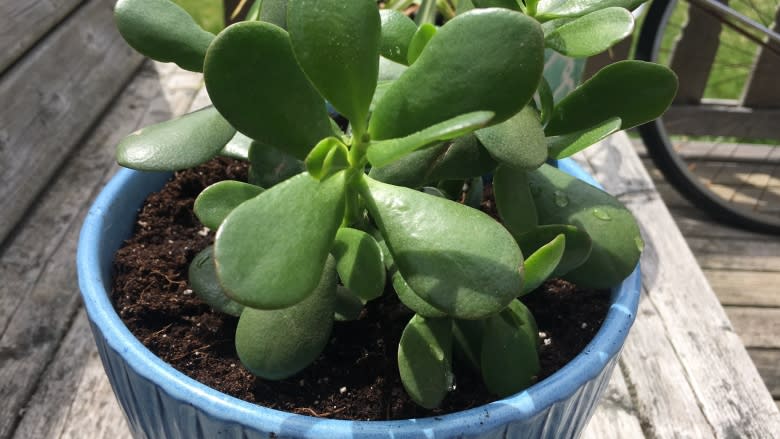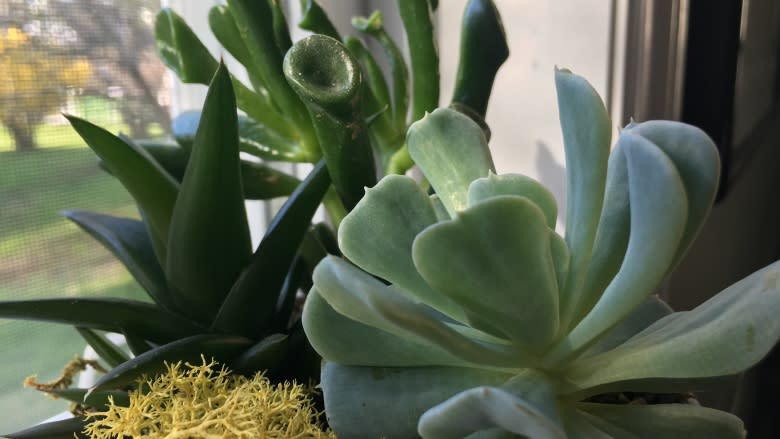5 tips to keep your houseplants alive
Houseplants can be a great way to bring some life into your home, but they also require a bit of care.
"There's just lots of rewards of enjoying and seeing something actually grow," said Alan Preston, co-owner of Hearts and Flowers in Charlottetown.
"What I find about plants and flowers is you're constantly learning about them," said Bernadette Praught, owner of Bernadette's Flowers in Stratford, P.E.I., adding that that "life-long learning" is what she loves most about caring for plants.
Both Preston and Praught care for and sell houseplants, and shared their tips to keep them alive and thriving.
1. Let there be light
Preston says lighting is the most important thing to make sure your plants thrive.
"It's what feeds the engine of the plant," he said. "Plants can be categorized as low light, medium light or high light, but all plants need light."
He suggests putting plants in windows in the winter so they get more light — and then putting them back a few feet in the summer to make sure they don't overheat through the glass.
This time of year, he suggests putting plants outside on a rainy day.
"Give them a bit of cleansing fresh air and reasonably strong light, even though it is overcast," he said.
2. Mind the water
Praught says one of the most common issues she hears from customers is browning leaves — often a sign the plant is getting too much water.
"Plants would prefer to be a little bit more on the dry side than too wet," she said.
Preston suggests putting your finger "right down in the soil" to see if a plant needs to be watered. If it feels dry, water it, and if it feels moist, wait.
"Most people kill their plants with kindness, because they over water them," he said. "When we water them, we tend to water them well, soak them well and then allow the water to drain off in the sink."
Praught adds that a droopy plant is often a sign the plant isn't getting enough water.
3. Keep the bugs away
Praught says spraying with soapy water works to prevent bugs — and if you do get an infestation, pull that plant away from the others while you're treating it.
Preston recommends spraying the front and backs of the leaves of your plants every two to three weeks with a product called Safer's Soap — an insecticidal soap — to keep bugs away.
Soap works well for bugs like spider mites and aphids, but there are some pests that are harder to get rid of, he said.
"There are certain insects … like mealybug which is a white fluffy dot that comes on some of the plants. You can try rubbing alcohol on it … but you've just got to throw that plant out, you're not going to get rid of the mealybug."
4. Find your own way
Praught points out that every plant comes with its own needs — and the care changes depending on where it is and what the light is like.
"We tend to refer to the plants at the shop here very much like a pet," said Praught, adding that people have to figure out the best ways to care for their specific plant.
"I couldn't tell them how to look after their dog," she laughed.
5. Be patient
Preston dismisses the idea that some people are unable to keep plants alive, no matter how hard they try.
He says usually it's a matter of being patient.
"Some people really want it to grow so fast — I do it myself when I'm putting my garden in. I want it to grow fast and I put too many seeds in and I overbed and I don't do things right … but you have to just be patient," he said.
"It'll grow … there's lots of easy plants, cacti and succulents that thrive on neglect."
What to get
Both Preston and Praught suggest pothos and philodendron as plants that are easy to take care of. In addition to succulents and cacti (many cacti are succulents), Preston also recommends English ivy, ferns, goldfish plant, phalaenopsis orchid and hibiscus as low-maintenance choices.
Praught suggests peace lily, Chinese evergreen, sansevieria (also known as a snake plant), and rubber tree as easy options.
Preston says right now the fiddle-leaf fig and split-leaf philodendron are very popular.
Bernadette says that succulents — including cacti, aloe vera and jade — are popular picks, as well as air ferns and herbs like rosemary.
More P.E.I. news



